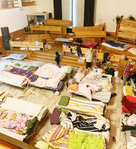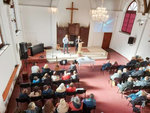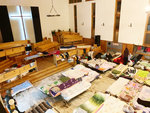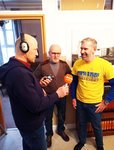Chris Cook of Columbia, Mo., formerly of Belle, recently returned from a Future Leadership Foundation (FLF) trip to Poland where casualties from the Ukraine war have spilled over the country’s …
This item is available in full to subscribers.
We have recently launched a new and improved website. To continue reading, you will need to either log into your subscriber account, or purchase a new subscription.
If you are a current print subscriber, you can set up a free website account by clicking here.
Otherwise, click here to view your options for subscribing.
Please log in to continue |
|








Chris Cook of Columbia, Mo., formerly of Belle, recently returned from a Future Leadership Foundation (FLF) trip to Poland where casualties from the Ukraine war have spilled over the country’s borders.
“We have family in Ukraine and this thing is personal,” said Cook, a 1989 Belle alumni graduate. “When Russia invaded sections of Ukraine, people we knew filtered into Poland.”
The relationship between the Future Leadership Foundation, Ukraine and Poland started years ago within the ministry.
“The Foundation got its starts from Belarus,” Cook said. “They invited us over to Lviv, Ukraine, five or six years ago where they sponsored us and we got acquainted with the people of Lviv.”
FLF’s major mission is to help leaders.
“We encourage them to take trips over there,” Cook said. “We believe in leadership development and the only money we raise is for travel and leadership development.”
FLF led to personal relationships with families who lived a world apart from each other. Cook’s family would eventually sponsor an exchange student, the son of a pastor he met, to study in the United States.
“We’ve spent the last three or four years cultivating that relationship,” Cook said. “At the beginning of the year, Future Leadership Foundation was taking people to Ukraine to train.”
As the conflict escalated and volunteers backed out of the training, Cook still planned to go.
“The Polish are very slow about opening up and building a relationship,” Cook said. “They are very reserved. This is the first time they have asked me to come and be a part of a pastor conference in Warsaw (Poland).”
Therefore, when Cook was invited months ago to Ukraine and Poland through the Foundation to teach and preach, he wholeheartedly accepted. Weeks before he was supposed to leave on the March 3-14 trip, Russia invaded Ukraine. While more volunteers backed out due to the threat, Cook traveled anyway.
Cook said no sooner than he landed in Poland, his following on Facebook exploded. Friends in the states desperately reached out to him, asking for resources for their family members or friends who were fleeing from Ukraine and entering Poland with nowhere to go. Cook said at that point, his status as a “learner” evolved.
“I am now a volunteer field worker with Future Leadership,” Cook said about his thoughts at that point. “But when the invasion occurred on Feb. 24, the mission changed from going to Ukraine and Poland to just Poland.”
The original mission of Cook’s trip was working with the Polish Baptist Union to build relationships.
“The mission in Poland kept changing because the environment was changing,” Cook said.
The instant he was on the ground, he was constantly on go.
“I was based at a Warsaw Seminary they were using to house Ukrainians,” Cook said. “I saw a couple from northern Ireland bring 10 lorries, 18-wheeler truckloads of goods.”
The couple that brought the lorries have close ties to Poland. The wife who was originally from Krakow, Poland, said her grandma had seven siblings and lived in Krakow. When the Nazis invaded they hid in the forest and when they came back to their house, it was burned down.
When the woman later married someone from Ireland and moved, she took those memories with her — all of which came flooding back when Russia invaded Ukraine.
“There is a national memory of the 1939 Nazi invasion,” Cook said. “It fuels the desire for the Polish to help Ukraine. Almost every Polish family is doing something to accommodate the need.”
Church buildings had already been transformed into help centers by the time Cook arrived. Mattresses were brought in for families to sleep on.
“In one case where they were close to the border, the Baptists turned their church into storage, help center — used to house Urkainans,” Cook said. “When they didn’t have room for worship, the community of Chelm, Poland, invited the church to use their community center for worship.”
Chelm is located four or five miles from the Polish border. During his first few hours in Poland, Pastor Hendrky Skrzypkowsk of the Chelm church took visitors to the border.
“On the Polish side there are emergency vehicles to keep people from sightseeing along the border,” Cook said.
During each stop to get to the border, Skrzypkowski told Polish emergency services personnel that they wanted to go to the border to pray and it was up to the guards if they would let the group in.
“They did,” Cook said, noting they were even enthusiastic about the prayer group. ‘They gave us 25 minutes.”
From the first evening, Cook didn’t stop traveling.
“I traveled north and west in Poland, touring churches and help centers,” he said. “The Polish Baptists Union have a number of different church camps scattered throughout Poland they were turning into help centers.”
Several church camps were being remodeled to receive Ukrainians coming across the border. The goal was to move families into permanent residencies as soon as possible. The camp cabins were originally rudimentary, so they needed to be insulated, heated and cooled to house families.
“The Ukrainians did the work,” Cook said. “The Polish Baptists Union supplied the church camp with materials and they completed the work in a week.”
March 5 marked the first sermon he would preach during his visit.
“What I did was lecture at the pastor’s conference on March 5 with a group of Polish church leaders and they were at the Warsaw Baptist Seminary,” Cook said.
The language barrier is difficult enough when services must be translated from a first language to a second, but Cook quickly learned a new level of challenge.
“I preached in English with a translator, but the situation was evolving so much that the first weekend in Elk, Poland, not far from Belarus, prior to the beginning of the sermon they stopped and said ‘we have an English preacher and the translator can interpret it into Polish, but they had Ukrainians too and wanted to make sure they weren’t feeling left out,” Cook said. “Then there were also Russians speakers present.”
Cook explained there is a science to preaching a sermon that will be translated into another language.
“I don’t use a lot of illustrations because culturally it may not translate,” he said. “Prepare services in short sentences so the interpreter could keep up.”
His prepared sermon talked about Poland as the heart of Europe.
“I said that Poland is kind of shaped like a heart,” Cook began. “It is a supposedly eastern country but it’s more centrally located. Poland is the heart of Europe and in times of war a heart must beat strong, especially in times of war.”
The Baptist Union President Peter Mescavich encouraged Cook to spread the message.
“Poland is a hidden treasure and often overlooked,” he said.
After the services, Cook stepped into another room where he was interviewed by KMOU via Zoom and again by the Polish Press with Mescavich to assist.
On March 6, Cook returned to the church camps.
“Up around Elk in northern Poland, a church camp housed 42 Ukrainians,” Cook said. “They were all family who came across the border together.”
Cook prayed with the family, but the meeting was interrupted by the Polish Police.
“The Polish Police showed up and asked us to step away,” Cook said. “We finished praying with the family and stepped back. They were wanting to interview the family for knowledge of war crimes.”
The police asked the family if they had experienced war crimes, wanted to make sure they didn’t have any problems with Russian soldiers or Russian aggression on their way across the border. That was on March 6, three days after Cook arrived in Poland.
“Every day I was talking to pastors and their families or Polish families,” Cook said. “I was fairly well acquainted with four or five families already who were pastors or church leaders. I met so many people, I lost track of them all.”
Ukrainians won their freedom in 1991 and saw a substantial improvement in their quality of life, according to Cook.
“Ever since I have been in Ukraine over the past seven years their standard of living has gotten better,” he said. “They don’t want to be tied to Russia but to the western world.”
It is telling that the families had to leave their homes so abruptly by the little amount they took with them.
“One girl said her birthday is in April and was hoping it would be over so she could go back home,” Cook said.
Church sanctuaries and seminaries throughout Poland, such as the one at Elk Church, were filled with mattresses to house guests, yet Cook said he admired that they served him as if he were the one in need of comfort.
“It was humbling that when I would sit down to have a meal with the Ukrainians, they would help me or serve me,” Cook said. “In this culture, it is rude not to eat. In one instance there was an older man sitting at the table with two sandwiches and he gave me one of his sandwiches.”
During the day, Cook traveled, prayed and helped where he could, even if it was just listening. At night, he would write about his experiences and do his best to connect requests for resources from his followers on social media.
“Because of my involvement in Ukraine, there are a lot of people who know me,” Cook said. “I taught in Philidelphia and am Facebook friends with students who were Ukrainian American I had taught.”
The school in Philadelphia where he taught was an extension of the Ukraine Baptist Theological Seminary which was an extension of the Ukraine Baptist Theological Seminary located in Lviv, Ukraine. They help to train Ukrainian-American church leaders.
They were contacting me, asking about family in Ukraine. Asking ‘can you give me contact information’ or ‘I have a sister or a grandma in (insert town) in Poland and I don’t know where can they find refuge?’ I don’t know everything and I was there to learn. I was trying to absorb what was going on. There were so many asking ‘can you help my family get to a place.’”
Eventually, Cook learned of Polish contacts to pass along.
From his American friends, Cook was surprised to receive a different request.
“On the American side, I got ‘I have seen your post and want to help remodel a church camp. Where do I give?’”
Luckily, the Future Leadership Foundation was anticipating help and set up accounts to collect funds. The Foundation gives funds to Poland, Lithuania, Moldova and Ukraine because they partner with those countries and spread resources out to help them.
Since returning home on March 16, Cook said he has been working to get over jet lag, but also to step back emotionally.
“This has been a trip like none other,” he said. “It’s grueling. It’s emotional. There was a charge in the air in Poland, high adrenaline. The government and Polish families were focused on taking care of their Ukrainian guests and they were so focused on that, they don’t have time to worry about if this fight will spill into Poland.”
There is a high adrenaline level to take care of those who have lost everything.
“I got caught up in that,” Cook said. “I was always on. Even when I was out, doing, sightseeing or souvenir shopping, I felt that charge and that tension.”